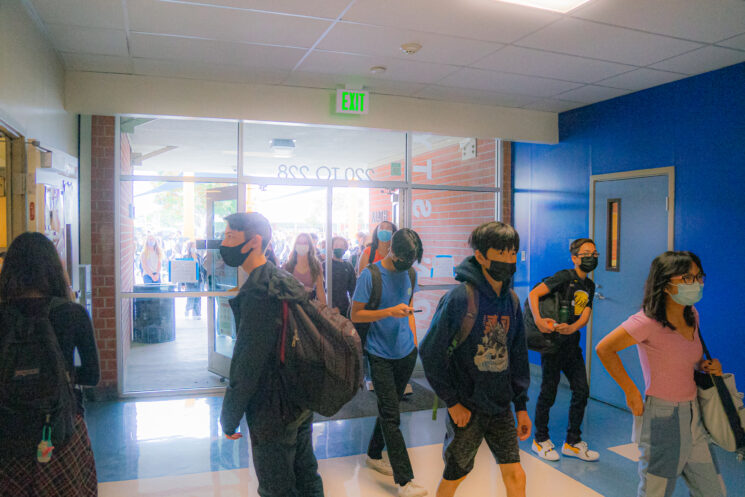
By Cate Meister and Reese Meister
Fountain Valley High School (FVHS) teachers voted on a new schedule for the 2022-2023 school year from Tuesday, April 26, to Thursday, April 28 in response to Senate Bill 328 (SB 328). Months before this round of voting, teachers voted to maintain a traditional schedule, leaving any options for a block schedule out of the final decision process.
Two committees contributed to the process of developing next year’s bell schedule: the Bell Schedule Committee and the Process Committee. According to FVHS math teacher and leader of the new bell schedule project Shannon Atkins, the Process Committee held the responsibility of creating surveys to assess the opinions of both staff and students. They compiled the survey results and used their findings to recommend factors that the Bell Schedule Committee should consider.
The Bell Schedule Committee then suggested a selection of schedules, revised and edited them and eventually shared the options with the FVHS staff. At a meeting, the staff voted for two schedules out of three options, and they later voted again for the final schedule.
This process looks different from other schools’ in the Huntington Beach Unified High School District because the teachers’ union contract provides freedom to make these decisions.

Under SB 328, California high schools will not be permitted to start school before 8:30 a.m., meaning all suggested schedules had to comply with this requirement. Lawmakers intended for the bill, which goes into effect this July, to promote learning. Studies have shown that teens receive more sleep with later school times, leading to better focus.
Although school will start later, the schedule also needs to fulfill a certain number of instructional minutes per year, and any class time before 8:30 will not count toward this requirement. FVHS will continue to hold zero period before 8:30, but time in the following periods must be extended in order to meet the instructional minutes requirement.
However, Atkins pointed out a few disadvantages in the requirements of the new Senate bill. She predicts that, while students will sleep later in the morning, they will also stay up later each night. Additionally, students will face scheduling conflicts with extracurricular activities or jobs.
Some students voiced similar concerns for the new bell schedule’s interference with any after school activities that they may have.
“I don’t like the new bell schedule because all periods get out later than usual in school and at 3:30 instead of 2:30,” sophomore Matthew Pham said. “I feel like that’s way too late in the day— we’re not able to do any homework or do any extracurriculars outside of school.”
Atkins believes that students may not consider the impact the schedule will likely have on many teachers as well. With her own kids in elementary school, which is released at 2:35, Atkins will finish the school day almost an hour later at 3:29.
“[Getting out at 3:29] is going to have a huge impact on teachers that are parents and teachers that are coaches— even students’ parents, now trying to work around their work schedule, other siblings getting dropped off and things like that,” Atkins said. “It’s going to be difficult for everybody.”
While staying in line with the requirements of the state, the Process Committee and the Bell Schedule Committee did their best to adapt to the needs of the FVHS community by taking student and staff voices into consideration.
“One of the main goals of this year was to get as much input as possible from as many stakeholders as possible,” Atkins said.





